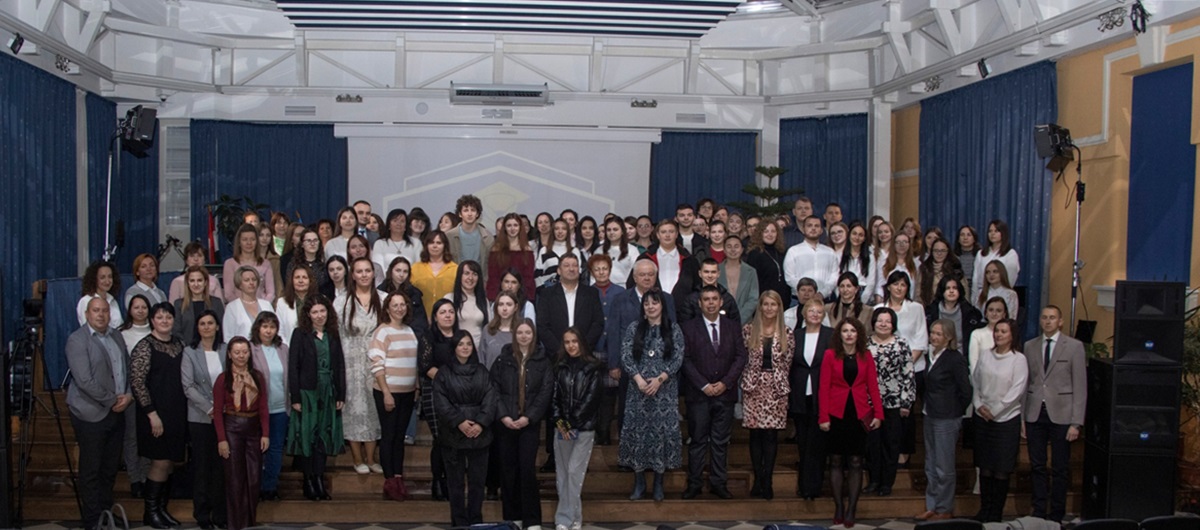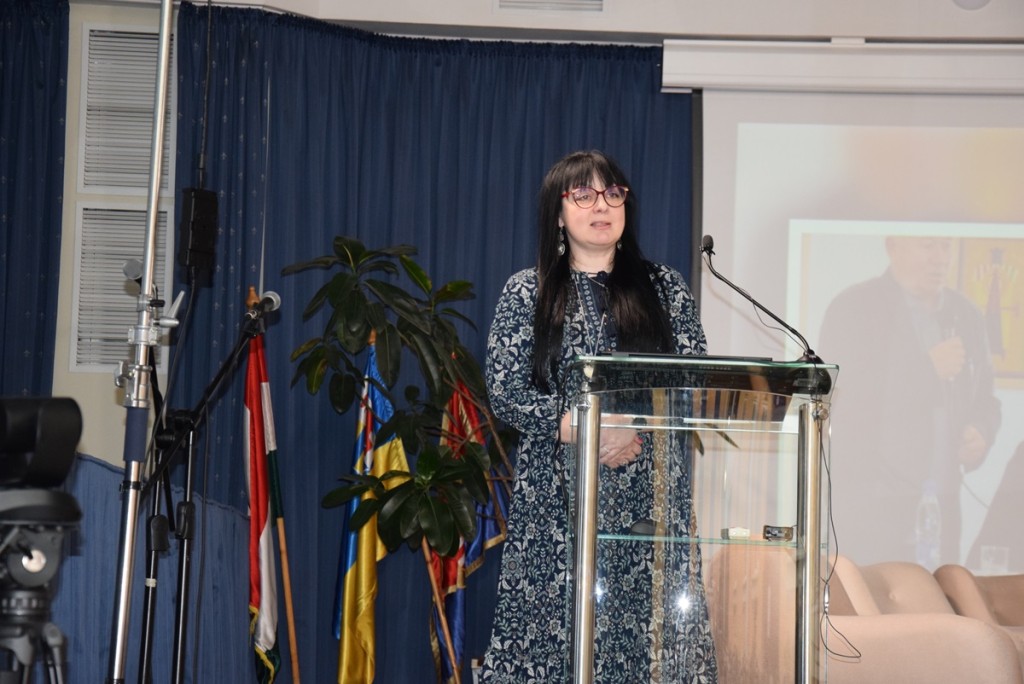English 30, Hungarian 20, Ukrainian 20: jubilee celebration at the Department of Philology
This year, the Department of Philology at Ferenc Rakoczi II Transcarpathian Hungarian College of Higher Education celebrates a special milestone: the English teacher training program began 30 years ago, while the Hungarian and Ukrainian teacher training programs started 20 years ago. These programs play a vital role in preserving national identity and linguistic diversity. To mark the occasion, the Department of Philology organized a jubilee celebration, held in the college atrium on November 13.
At the beginning of the event, Szilveszter Ferku, a laboratory assistant in the Department of Philology, performed the poem Útban Törökország felé by László Vári Fábián.
Following this, Dr. habil. Anikó Beregszászi, head of the Department of Philology, welcomed the attendees, highlighting that Ferenc Rakoczi II Transcarpathian Hungarian College of Higher Education began operating as an independent institution in 1996 under the name Teacher Training College. The English teacher training program was launched in 1994 as an extension program of the György Bessenyei Teacher Training College in Nyíregyháza, marking its start 30 years ago. The Department of Philology, one of the institution’s oldest units, was established in 1998 under the name Department of Linguistics. The Hungarian and Ukrainian teacher training programs began 20 years ago, in 2004, organized into paired specializations according to the opportunities of the time. Since 2012, the department has been training undergraduate teachers specializing in Hungarian language and literature, Ukrainian language and literature, and English language and literature. A master’s level program has been available since 2017, offering degrees in Hungarian language and literature and Ukrainian language and literature, while since 2019, a master’s degree in English language and literature has also been available. In 2022, the Department of Philology, in collaboration with the University of Miskolc, launched dual degree programs in four specializations—Hungarian, English, and German at the undergraduate level, and Hungarian at the master’s level. In January 2023, the campus hosting the department was named after its founding head, István Kótyuk. In the current academic year, three new philology programs were introduced: English-Hungarian translation and interpreting, English-German translation and interpreting, and Ukrainian-Hungarian translation and interpreting. Thus, we now offer a total of 12 training programs for students. “We have 40 teachers and 501 students. Over the past decades, we have awarded 1 341 diplomas to 978 individuals in the English, Hungarian, and Ukrainian programs, meaning that several of our students have obtained more than one diploma from the department” – she added. In line with the college’s mission, the department not only offers academic programs but also builds a community, fosters the next generation of scholars, and supports and develops forms of artistic self-expression and talent manifestation.
“The community-building strength of the Rákóczi College and, within it, the Department of Philology, is shown by the fact that many of our graduates take on active roles in the Hungarian public life of Transcarpathia, within its institutions, schools, and civil organizations. We are glad that many of them are here with us today to celebrate together. I am grateful to all our former and current students and colleagues who joined us for today’s celebration. And I think with a grateful heart of those students and colleagues who, due to circumstances, unfortunately cannot be here with us in person,”
she added.
Finally, she placed a quote from Sophocles on the hearts of the students: “That is my blood, my nature – I will never betray it, never fail to search and learn my birth!”
“30 years is no small amount of time in a person’s life, nor in the life of an institution. Therefore, I would primarily honor those who were present at its birth and who helped guide the path of the Transcarpathian Hungarian Teacher Training College from the very beginning, including the operation of the Department of Philology,”
emphasized Dr. Andrea Bocskor, Member of the European Parliament (2014–2024). She added that she takes great pride in having been part of the institution’s life, first as an English-History major student and later as a staff member of the Department of History and Social Sciences.
“Today, November 13th, is the Day of the Hungarian Language. That is why it is such a great thing that today, from Brussels, I can speak in Hungarian to you, who are in Ukraine, in Beregszász. There have been those who stood up for our language, for our linguistic rights. They deserve our gratitude,”
said Dr. Viktória Ferenc, Member of the European Parliament, who emphasized the importance of multilingualism alongside the preservation of the mother tongue.
Next, Dávid Lajos Mándy, a student of the Ukrainian-Hungarian translation and interpreting program, performed Monti’s Csárdás on the violin.
Following this, Dr. Vilmos Gazdag, the Deputy Head of the Department of Philology, gave a presentation on From Extension Programs to Teacher Training and Dual Degree Programs.
After this, Nikoletta Burger, a student of the Ukrainian program, performed Lesya Ukrainka’s poem Contra spem spero!, followed by Dorina Bacskai, a Hungarian program student, presenting the Hungarian translation by László Csordás. Dajana Hubalj, a student of the Ukrainian program, recited Pavlo Tychyna’s Ukrainian poem Do you know how the linden tree rustles?…, with Eszter Huzina, a Hungarian program student, performing the Hungarian translation by Tamás Nagy.
After the recitations, a panel discussion took place, where Dr. Ildikó Orosz, Prof. Dr. István Csernicskó, Dr. habil. Anikó Beregszászi, Dr. Judit Kecskés, and Dr. Tamás Vraukó shared stories about the launch of philology teacher training and the past 30 years. The discussion was moderated by Dr. László Csordás.
After the discussion, we had the opportunity to listen to the third-place winning entry of the All-Ukrainian Student Shakespeare Translation Competition, presented by Viktória Rotkovszka.
Next, we listened to Hungarian and Ukrainian folk songs performed by students Szilveszter Ferku, Tetyána Komonyi, Hanna Munkácsi, Szofia Moldavszka, Miklós Kozák, and Dávid Mándy.
After the performance, another panel discussion took place, where Dr. Ilona Huszti, Dr. Erzsébet Bárány, Dr. Margit Kész, Dr. László Vári Fábián, Dr. Katalin Fodor, Dr. Magdolna Séra, Ildikó Puskás, Katalin Somi, Gabriella Taranenko, Erika Pavljuk, Dorina Bacskai, and Milán Rácz shared their thoughts on philology training. The discussion was moderated by Krisztián Váradi.
“Congratulations to the leadership of the college, the faculty, and the students of the Department of Philology on celebrating the 30th anniversary. We view the college as one of the bastions of the preservation of the Transcarpathian Hungarian community, which is why it is particularly important that this event could take place,”
said Ádám Stifter, Deputy State Secretary for Eastern Relations Development at the Ministry of Foreign Affairs and Trade.
To conclude the event, we were treated to a literary presentation celebrating the Day of the Hungarian Language. The program was put to stage by Dr. Réka Máté, Associate Professor at the Department of Philology, using works by both former and current creative writing students and faculty of the institution.
Anita Kurmay
-
This article is also available in
Українська
Magyar


